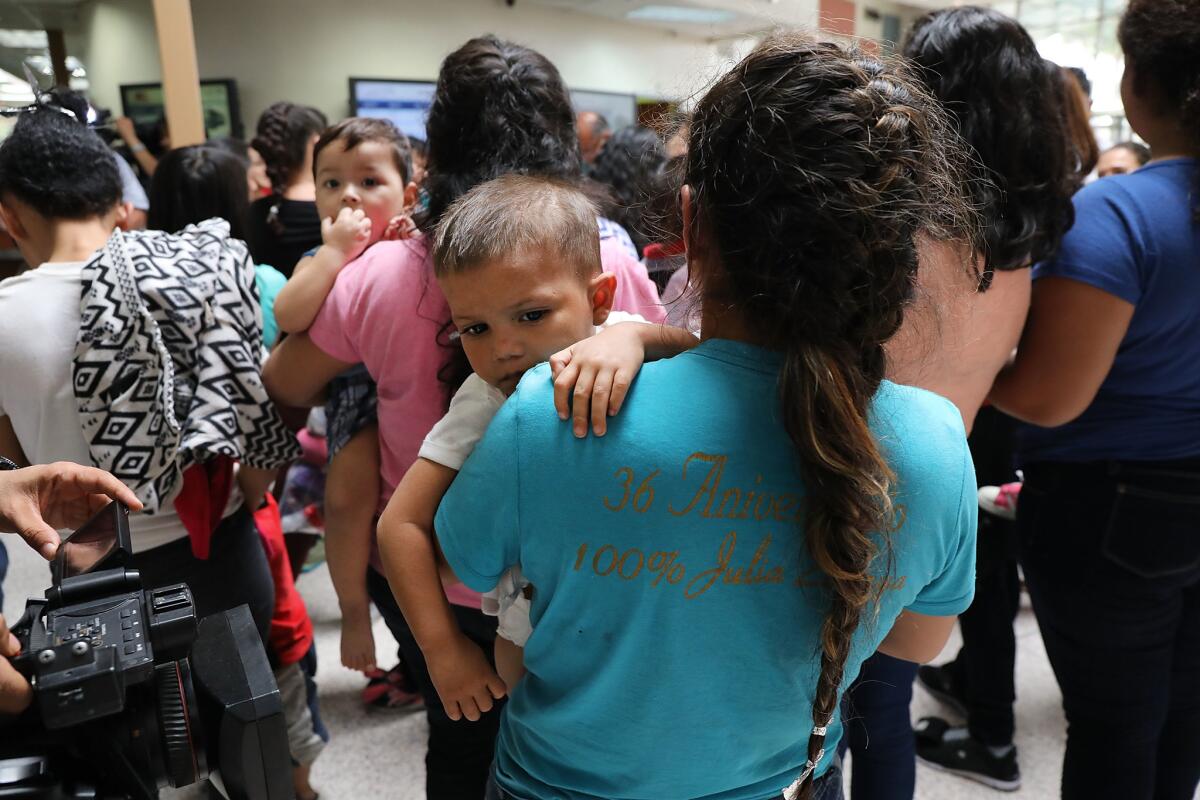Opinion: Restore asylum for women fleeing abuse and death

Every day, courageous women and girls arrive at our southern border seeking refuge from unimaginable violence. Under our laws, they have the right to apply for asylum and have their cases heard. But rather than offering protection, the Trump administration is determined to send them back to the countries they have fought so hard to escape.
On Thursday, Sen. Patrick Leahy (D-Vt.) and Rep. Zoe Lofgren (D-Calif.) introduced the Refugee Protection Act. The bill lays out a plan to allow women and girls fleeing gender-based violence the opportunity to obtain asylum, and bring our country back in line with its humanitarian commitments. It’s a vision that all members of Congress should be able to get behind, even at a time of bitter partisanship.
It’s no secret that this administration is systematically dismantling our asylum law. Women and children have borne the brunt of the suffering — from the egregious policies of family separation and “Remain in Mexico,” to the quiet publication of decisions by the attorney general that have closed door after door to those seeking safety.
The Refugee Protection Act would rectify many of these inhumane actions, and includes language to reverse recent decisions that have made it nearly impossible for women fleeing domestic violence or gang brutality to qualify as refugees.
One of those decisions — known as Matter of A-B- — was handed down by then-Atty. Gen. Jeff Sessions in 2018. That decision has been used to limit the legal definition of “refugee” in an attempt to eliminate the possibility of asylum in the U.S. for victims of domestic violence, sex trafficking and other gender-based human rights violations. Since then, we have seen asylum approval rates plummet for women, children, and families arriving at our southern border.
The Matter of A-B- case involves a domestic violence survivor from El Salvador, who fears she will be killed if she is deported to her home country. My organization, the Center for Gender & Refugee Studies, has represented A.B. in her asylum case for nearly two years.
In El Salvador, A.B., a courageous and resilient woman, endured over 15 years of beatings, rapes, death threats, and psychological abuse at the hands of her husband. She secured a divorce and even moved to another part of El Salvador, desperate to escape her abuser. But no matter where she went, he tracked her down. When she requested a restraining order, the police provided her one — and told her to hand-deliver it to him. Fearing that he would make good on his threat to kill her, she fled to the United States.
In 2016, A.B. was granted asylum by the highest administrative tribunal in the immigration system, the Justice Department’s Board of Immigration Appeals. But in a highly unusual procedural move, Sessions seized upon A.B.’s case, overturned the grant of asylum, and used it to declare that the United States should no longer extend protection to domestic violence survivors.
A.B. has appealed Sessions’ action, but until a final decision is reached, she remains terrified that she will be deported. Countless other women who have made the arduous journey to the United States also face a hostile immigration system and, post-Matter of A-B-, an even harder legal battle.
Congress has an opportunity to correct this. The new bill would clarify legal requirements for asylum and provide clear guidance for cases involving gender-based violence. It would ensure that asylum seekers like A.B. get a fair opportunity to argue her claim before a judge.
The United States has a long history of giving refuge to people who’ve come to our shores. This measure would be a step toward restoring that tradition.
Karen Musalo is a law professor and the founding director of the Center for Gender & Refugee Studies at UC Hastings College of the Law. She is also lead coauthor of “Refugee Law and Policy: An International and Comparative Approach (5th edition).”
More to Read
A cure for the common opinion
Get thought-provoking perspectives with our weekly newsletter.
You may occasionally receive promotional content from the Los Angeles Times.






